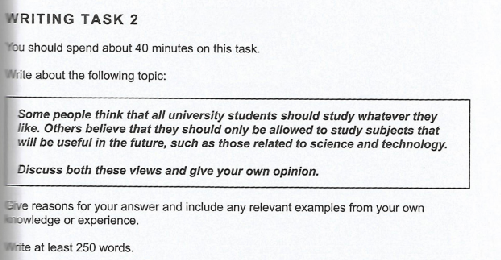剑桥雅思10写作:Test2雅思写作task2真题+范文
发布时间:2021-03-02 关键词:
本篇雅思写作主题,新航道雅思培训师资从不同的角度写了两篇范文,今天分享的是篇范文。
Some people think that all university students should study whatever they like. Others believe that they should only be allowed to study subjects that will be useful in the future, such as those related to science and technology. Discuss both these views and give your own opinion.
a)题目分析,包括写作中需要讨论的观点以及考生可能对题目产生的错误理解。
考生需要确定哪种课程是被认为有用的,且推断出哪种课程未来也将十分有用。应将重点放在“有用”上——考生应该在真实的论证基础上证明自己的观点。
b)两篇观点不同的参考范文
参考范文1——不能只学“有用”的学科
In this essay, I will argue that while graduates in a certain field are necessary for a healthy economy, a society as a whole benefits from a plurality of experts.
Nowadays, subjects such as finance, accounting, engineering and chemistry are regarded as desirable fields of study due to the demand from businesses for graduates able to push R &D forward or keep the wheels of the company running smoothly. Graduates from the so-called STEM subjects have been shown to consistently outrank their peers in earning potential straight out of university, leading to the logical conclusion that humanities subjects, such as history, art or literature, are less desirable or even pointless wastes of time. While this is certainly true from a purely mercantile point of view, we must ask ourselves what a society comprised entirely of STEM graduates would look like.
Immediately, one can see two problems arising from this scenario. The first is that there are only a certain number of jobs to go around. If everyone were to study only those subjects deemed worthwhile by corporate interests, we would swiftly see a rise in the number of overqualified engineers serving burgers in McDonalds and neuroscientists washing car windshields. While the average level of skeptical empiricism among the public would rise (a good thing), it would almost certainly lead to a rebalancing of the scales, where the value of STEM graduates would steadily decline (probably a bad thing). Secondly, we are forced to ask ourselves what the measure of a man truly is. If a man is defined purely by his earning potential, then this would be a utopian vision - unfortunately, man appears to be a messy, complex animal, driven by multiple needs.
Famously, Maslow defined the hierarchy of these needs as food, shelter, clothing, socialisation and self-actualisation, the last point being particularly pertinent to this argument. What kind of television would we watch in this society? Endless channels devoted to university lecture courses perhaps? A series devoted to an accountant as she works her way from one end of a fiscal ledger to the next? What music would we listen to? Maybe a mathematically perfect sequence of notes, procedurally generated from an algorithm. With such “wooly” subjects as psychology and social care gone, what happens to the soul? What happens when the unregulated world of emotion and desire come into conflict with the regimented order of such a system?
Much as its advocates would like to deny it, such a society would exist only to churn out automata - people engineered to fill a function,with all the quirks of personality an aberration unable to be neatly placed into an excel column and therefore superfluous to needs. While such a society would be immensely profitable, one must ask whether it could truly be called human.
(468 words)
在这篇文章中,我将讨论尽管特定专业领域的毕业生对经济的健康发展十分必要,但社会作为一个整体,需要各行各业的专业人才的参与。
现今,财务、会计、工程及化学等学科被认为是热门专业,因为企业需要这样的毕业生去推动科研开发或保证公司的平稳运转。所谓的科学、技术、工程、数学学科方面的毕业生,其离校后的薪资潜能一直高出同龄人。这使得人们很自然地认为历史、艺术或文学不值得学习甚至是毫无意义的浪费时间。从纯粹的商业视角来说,这一看法的确是正确的,但是我们必须拷问自己,一个完全由科学、技术、工程、数学领域的毕业生组成的社会将是什么样子。
在这种情境中,人们很快就会发现两个问题。,工作岗位有限。如果人人都只学习那些被认为对企业效益有利的学科,我们很快就会看到,资历较高的工程师在麦当劳卖汉堡,而神经系统科学家则在洗车。公众的怀疑经验论的平均水平将有所上升(这是一件好事),但几乎可以肯定的是,这将引起新的不平衡,那就是科学、技术、工程、数学毕业生的价值会普遍降低(也许这是一件坏事)。第二,我们必须追问自己衡量一个人的真正标准究竞是什么。如果人单单只由薪资潜能来定义的话,那么事情就理想许多——但不幸的是,人似乎是一种混乱、复杂的动物,被多种需求所驱动。
的马斯洛将这要需求等级划分为吃饭、住宅、穿衣、社会需求和自我实现需求,其中最后一点与本文的论述密切相关。在那样的社会中,我们会观看哪种电视节目?也许多数频道都在讲大学公开课?还有关于一个女会计从一张财务报表讲到下一个报表的系列节目?我们会听什么音乐?也许是一串通过运算法则推导出来的排列完美的音符。随着那些“虚幻”学科(如心理学和社会学)的消失,我们的灵魂会怎样?当杂乱的情感、欲望与这一体系的整齐划一形成突时,又会发生什么?
尽管推崇这种社会的人会提出反对意见,但事实是这样的社会只会炮制出一批机器人——他们机械地去完成一项功能,而与性格相关的一切将无法被纳入其中,因此成为不必要的东西。尽管这种社会有利可图,但人们就得追问自己是否还能真正称为人。




